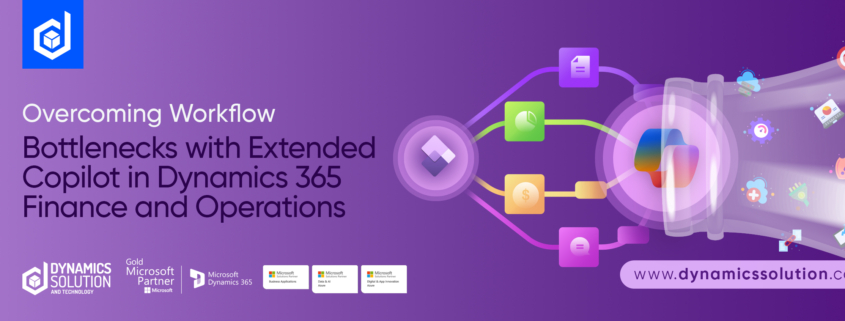Did you know that a staggering 75% of finance professionals report encountering workflow delays due to manual processes and communication gaps? These inefficiencies can hinder an organization’s ability to thrive in the market. Common bottlenecks such as manual data entry, approval delays, and inadequate communication can lead to costly errors, lost opportunities, and a frustrating work environment.
As businesses strive to improve their operations, it becomes evident that addressing these issues is non-negotiable. Fortunately, the integration of Copilot within Dynamics 365 Finance and Operations provides a revolutionary solution to these pervasive problems. By using the power of artificial intelligence (AI) for task automation and decision-making support, it simplifies financial operations and enhances overall efficiency.
In this article, we will explore how Copilot extensions can help businesses overcome challenges by achieving next-level automation, ultimately transforming finance and operations into streamlined processes that drive success.
Understanding Workflow Bottlenecks in Finance and Operations
Identifying the common bottlenecks within finance and operations is important to understand its impact on business performance. For instance, manual data entry can lead to inaccuracies and wasted time, while approval delays can slow down critical processes. Furthermore, communication gaps between teams often result in misalignment and miscommunication, exacerbating inefficiencies. In finance, these issues can significantly delay reporting timelines and disrupt strategic decision-making.
Beyond immediate impacts, the long-term consequences of these inefficiencies can be severe. Organizations may find it difficult to scale operations or respond quickly to market changes. This can strain resources, create employee burnout, and even ultimately result in a loss of competitiveness. Understanding these bottlenecks highlights the urgent need for innovative solutions like Copilot in Dynamics 365 Finance and Operations, which can help overcome these challenges.
The Role of Copilot in Dynamics 365 Finance and Operations
At its core, Copilot is an advanced AI-driven assistant designed to enhance the capabilities of Dynamics 365 Finance and Operations. It serves as a pivotal tool for automating tasks across financial operations. By leveraging the power of artificial intelligence, Copilot streamlines mundane activities, allowing finance professionals to focus on more strategic initiatives.
Through its core functionalities, Copilot automates repetitive tasks such as data entry, invoice processing, and report generation. By significantly reducing the risk of human error, businesses can trust the accuracy of their financial data. Moreover, Copilot’s intelligent decision-making support uses AI to analyze data trends and deliver insights that can guide key strategic decisions.
For instance, Copilot effectively tackles approval delays by automatically directing tasks to the appropriate personnel and sending real-time notifications. This enhances the efficiency of approval processes, reducing bottlenecks. Moreover, Copilot promotes better communication by providing a user-friendly interface for sharing information among departments, ensuring that everyone is on the same page.
By adopting Copilot, organizations can expect to see a transformative change that addresses inefficiencies and fosters a culture of collaboration and productivity.
Achieving Next-Level Automation and Efficiency
The automation capabilities offered by Copilot in Dynamics 365 Finance and Operations are tailored to meet diverse business needs. For example, automated invoice processing allows finance teams to reduce manual input and enhance processing speeds resulting in faster payment cycles, which are the key factors in maintaining healthy client relations.
Additionally, budgeting and forecasting have become significantly easier with Copilot. The AI analyzes historical financial data and market trends to generate accurate forecasts, allowing businesses to make informed decisions with confidence. Reporting features powered by Copilot also streamline data collection and analysis, resulting in quicker reporting timelines and reduced workload.
Businesses leveraging these capabilities have experienced remarkable benefits. For instance, a retail company that implemented Copilot found that reduced manual intervention led to faster decision-making. With automated report generation, the finance team could allocate resources more effectively, enabling them to optimize inventory management and improve cash flow.
In a rapidly evolving market, the agility afforded by Copilot allows businesses to respond to changes swiftly. As organizations harness the automation capabilities of Copilot in Dynamics 365 Finance and Operations, they can expect heightened operational efficiency and increased competitiveness.
Steps to Implement Copilot with Dynamics 365 in Your Organization
Implementing Copilot extension with Dynamics 365 is a strategic process that requires careful planning. Here are the steps to get started:
Step 1: Assess Your Current Workflows
Begin by evaluating existing workflows to pinpoint bottlenecks. Understanding where delays occur provides a clear direction for improvements.
Step 2: Choose the Right Processes to Automate
Not all processes are equal. Select those workflows that would benefit most from automation. Targeting the right areas maximizes the impact of automation.
Step 3: Integrate Copilot with Dynamics 365
The integration process can be straightforward. Work with your IT team or a vendor to ensure that Copilot is effectively embedded within your existing Dynamics 365 systems.
Step 4: Monitor and Optimize
Once implemented, continuously monitor the effectiveness of Copilot. Gathering feedback will help you make necessary adjustments and improvements.
Automate Your Finance Operations with Dynamics Solution and Technology
Traditional processes can create obstacles that significantly hinder business operations. However, with the integration of Copilot in Dynamics 365 Finance and Operations, organizations can effectively combat these challenges. By embracing AI-driven automation, businesses can streamline operations, enhance efficiency, and ultimately position themselves for sustainable growth. We encourage organizations to explore the possibilities of implementing Copilot in Dynamics 365 Finance and Operations.
Contact Dynamics Solution and Technology today for expert guidance on implementing this powerful tool in your organization. Embrace the future of finance and operations and unlock the full potential of AI-driven productivity.







